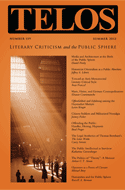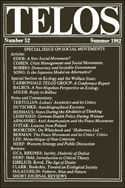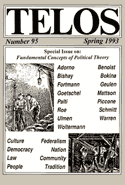By Wes Tirey · Thursday, August 16, 2012 Democratic theorists everywhere should be gushing—to some extent, at least—over the current Chick-fil-a controversy. While it is by no means an isolated instance of disagreement in the United States, it nonetheless displays in a public fashion the dissensus that is so central to the concept of democracy itself.
Democracy is inherently dialectical. That is, it is borne out of a tension that endeavors toward particular ends, such as liberty, equality, and autonomy. As its own kind of regime or regimes, the people (demos) of a democracy are to wield the power (kratos) that ultimately defines and renews the institutions they live under and the laws to which they are subject. This of course requires the organization of regimes within the public sphere to display their dissent or disagreement openly and freely.
Continue reading →
By Wes Tirey · Tuesday, July 31, 2012 Sean Franzel’s article “Toward an Anti-Monumental Literary-Critical Style: Notes on Walter Benjamin and Jean Paul” appears in Telos 159 (Summer 2012). Read the full version online at the Telos Online website or purchase a print copy of the issue here.
Wes Tirey: Can you tell us about how your article explores the question of the “public sphere”?
 Sean Franzel: My article explores the question of the public sphere rather indirectly, mainly via the assumption that the project of literary criticism involves the critic positioning him or herself vis-à-vis other critical voices. Criticism seems unavoidably to imply the existence of a/plural community/ies of discourse that debate the status of certain shared objects or topics of interest. My article focuses on two specific critics who take issue with modes of canonical or hegemonic critical discourse that heroize literary and philosophical figures and that cast them as larger-than-life personalities. In its modern form, these discourses begin in the Romantic period, and their legacies reach into twentieth-century authoritarianism as well as into contemporary celebrity culture. My article is interested in different ways that critics resist this heroizing, monumentalizing discourse. Additionally, I suppose that my article presumes the idea that the notion of the “public sphere” references a place where individuals take on certain public personae; in this context, I view figures such as Jean Paul and Walter Benjamin as seeking to counteract the fetishization of larger-than-life heroic public personalities. Sean Franzel: My article explores the question of the public sphere rather indirectly, mainly via the assumption that the project of literary criticism involves the critic positioning him or herself vis-à-vis other critical voices. Criticism seems unavoidably to imply the existence of a/plural community/ies of discourse that debate the status of certain shared objects or topics of interest. My article focuses on two specific critics who take issue with modes of canonical or hegemonic critical discourse that heroize literary and philosophical figures and that cast them as larger-than-life personalities. In its modern form, these discourses begin in the Romantic period, and their legacies reach into twentieth-century authoritarianism as well as into contemporary celebrity culture. My article is interested in different ways that critics resist this heroizing, monumentalizing discourse. Additionally, I suppose that my article presumes the idea that the notion of the “public sphere” references a place where individuals take on certain public personae; in this context, I view figures such as Jean Paul and Walter Benjamin as seeking to counteract the fetishization of larger-than-life heroic public personalities.
Continue reading →
By Wes Tirey · Friday, July 13, 2012 Brad Prager’s article “Offending the Public: Handke, Herzog, Hypnosis” appears in Telos 159 (Summer 2012). Read the full version online at the Telos Online website, or purchase a print copy of the issue here.
Wes Tirey: Can you tell us about how your article explores the question of the “public sphere”?
 Brad Prager: My essay was intended as an indirect engagement with questions concerning the public sphere. It offers a perspective on the work of author-artists Werner Herzog and Peter Handke, and I’ve chosen the term “author-artist” despite the fact that Herzog is, of course, best known as a film director. I’d like, at least in this contribution to Telos, to view this early part of Herzog’s career a little bit differently and see him as also a product of German art and literature of the 1970s, a time and place in which authors tended to be politically engaged, but also simultaneously influenced by German Modernism and discourses of aesthetic autonomy. Those two elements interact in an interesting way in the 1970s, and something like Herzog’s Even Dwarfs Started Small, which deals with revolution, is quite Modernist and can almost be described as avant-garde. It is a good example of how those tendencies come together. In the background of the essay is Peter Sloterdijk’s Critique of Cynical Reason, which was an influential and provocative book. Central to the piece is the question: how can an artist critique the public’s engagement with art, or how do you turn art into something critical and politically incisive, when it is immediately subject to appropriation, and may already have a cynical position built into it? Handke was trying to reshape the stage with his innovative plays, Kaspar and Offending the Audience. The latter of the two gives the essay its title; I’m toying with the sound of the term “Offensive Aesthetics,” advocated here, and Öffentlichkeit, the German term meaning “public sphere.” Brad Prager: My essay was intended as an indirect engagement with questions concerning the public sphere. It offers a perspective on the work of author-artists Werner Herzog and Peter Handke, and I’ve chosen the term “author-artist” despite the fact that Herzog is, of course, best known as a film director. I’d like, at least in this contribution to Telos, to view this early part of Herzog’s career a little bit differently and see him as also a product of German art and literature of the 1970s, a time and place in which authors tended to be politically engaged, but also simultaneously influenced by German Modernism and discourses of aesthetic autonomy. Those two elements interact in an interesting way in the 1970s, and something like Herzog’s Even Dwarfs Started Small, which deals with revolution, is quite Modernist and can almost be described as avant-garde. It is a good example of how those tendencies come together. In the background of the essay is Peter Sloterdijk’s Critique of Cynical Reason, which was an influential and provocative book. Central to the piece is the question: how can an artist critique the public’s engagement with art, or how do you turn art into something critical and politically incisive, when it is immediately subject to appropriation, and may already have a cynical position built into it? Handke was trying to reshape the stage with his innovative plays, Kaspar and Offending the Audience. The latter of the two gives the essay its title; I’m toying with the sound of the term “Offensive Aesthetics,” advocated here, and Öffentlichkeit, the German term meaning “public sphere.”
Continue reading →
By Wes Tirey · Thursday, June 21, 2012 As an occasional feature on TELOSscope, we highlight a past Telos article whose critical insights continue to illuminate our thinking and challenge our assumptions. Today, Wes Tirey looks at Norberto Bobbio’s ” Democracy and Invisible Government,” from Telos 52 (Summer 1982).
 “Democracy,” writes Jacques Rancière in Hatred of Democracy, “first of all means this: ‘anarchic government,’ one based on nothing other than the absence of every title to govern.” He adds: “Democracy is . . . the primary limitation of the power of forms of authority that govern the social body.” While Rancière’s suggestion that democracy is ‘anarchic government’ indeed seems paradoxical, and by all means requires careful unpacking, one thing that can be taken from it is that democracy is to be seen. That is to say, a political regime that requires active citizen-participation in which the body politic is self-governing requires political activity to therefore be made public. “Democracy,” writes Jacques Rancière in Hatred of Democracy, “first of all means this: ‘anarchic government,’ one based on nothing other than the absence of every title to govern.” He adds: “Democracy is . . . the primary limitation of the power of forms of authority that govern the social body.” While Rancière’s suggestion that democracy is ‘anarchic government’ indeed seems paradoxical, and by all means requires careful unpacking, one thing that can be taken from it is that democracy is to be seen. That is to say, a political regime that requires active citizen-participation in which the body politic is self-governing requires political activity to therefore be made public.
Continue reading →
By Wes Tirey · Tuesday, June 19, 2012 The cover of the most recent issue of The Economist reads: “Morals and the machine: Teaching robots right from wrong.” A short piece in the magazine states: “As robots become more autonomous, the notion of computer-controlled machines facing ethical decisions is moving out of the realm of science fiction and into the real world. Society needs to find ways to ensure that they are better equipped to make moral judgments.” Moreover, as robots “become smarter and more widespread, autonomous machines are bound to end up making life-or-death decisions in unpredictable situations, thus assuming—or at least appearing to assume—moral agency.”
Continue reading →
By Wes Tirey · Thursday, June 14, 2012 As an occasional feature on TELOSscope, we highlight a past Telos article whose critical insights continue to illuminate our thinking and challenge our assumptions. Today, Wes Tirey looks at Alain de Benoist’s “Democracy Revisited,” from Telos 95 (Spring 1993).
 In his book Radical Democracy, C. Douglas Lummis writes that democracy is a “whore among political words.” Indeed, anyone who sees the ideals of inclusionary dialogue and autonomy that democracy is supposed to represent juxtaposed with the “democratic” endeavors of certain political actors knows quite well that democracy and its meaning are in desperate need to be revisited. Alain de Benoist does just that in his article “Democracy Revisited.” In his book Radical Democracy, C. Douglas Lummis writes that democracy is a “whore among political words.” Indeed, anyone who sees the ideals of inclusionary dialogue and autonomy that democracy is supposed to represent juxtaposed with the “democratic” endeavors of certain political actors knows quite well that democracy and its meaning are in desperate need to be revisited. Alain de Benoist does just that in his article “Democracy Revisited.”
Continue reading →
|
|
 Sean Franzel: My article explores the question of the public sphere rather indirectly, mainly via the assumption that the project of literary criticism involves the critic positioning him or herself vis-à-vis other critical voices. Criticism seems unavoidably to imply the existence of a/plural community/ies of discourse that debate the status of certain shared objects or topics of interest. My article focuses on two specific critics who take issue with modes of canonical or hegemonic critical discourse that heroize literary and philosophical figures and that cast them as larger-than-life personalities. In its modern form, these discourses begin in the Romantic period, and their legacies reach into twentieth-century authoritarianism as well as into contemporary celebrity culture. My article is interested in different ways that critics resist this heroizing, monumentalizing discourse. Additionally, I suppose that my article presumes the idea that the notion of the “public sphere” references a place where individuals take on certain public personae; in this context, I view figures such as Jean Paul and Walter Benjamin as seeking to counteract the fetishization of larger-than-life heroic public personalities.
Sean Franzel: My article explores the question of the public sphere rather indirectly, mainly via the assumption that the project of literary criticism involves the critic positioning him or herself vis-à-vis other critical voices. Criticism seems unavoidably to imply the existence of a/plural community/ies of discourse that debate the status of certain shared objects or topics of interest. My article focuses on two specific critics who take issue with modes of canonical or hegemonic critical discourse that heroize literary and philosophical figures and that cast them as larger-than-life personalities. In its modern form, these discourses begin in the Romantic period, and their legacies reach into twentieth-century authoritarianism as well as into contemporary celebrity culture. My article is interested in different ways that critics resist this heroizing, monumentalizing discourse. Additionally, I suppose that my article presumes the idea that the notion of the “public sphere” references a place where individuals take on certain public personae; in this context, I view figures such as Jean Paul and Walter Benjamin as seeking to counteract the fetishization of larger-than-life heroic public personalities.  “Democracy,” writes Jacques Rancière in Hatred of Democracy, “first of all means this: ‘anarchic government,’ one based on nothing other than the absence of every title to govern.” He adds: “Democracy is . . . the primary limitation of the power of forms of authority that govern the social body.” While Rancière’s suggestion that democracy is ‘anarchic government’ indeed seems paradoxical, and by all means requires careful unpacking, one thing that can be taken from it is that democracy is to be seen. That is to say, a political regime that requires active citizen-participation in which the body politic is self-governing requires political activity to therefore be made public.
“Democracy,” writes Jacques Rancière in Hatred of Democracy, “first of all means this: ‘anarchic government,’ one based on nothing other than the absence of every title to govern.” He adds: “Democracy is . . . the primary limitation of the power of forms of authority that govern the social body.” While Rancière’s suggestion that democracy is ‘anarchic government’ indeed seems paradoxical, and by all means requires careful unpacking, one thing that can be taken from it is that democracy is to be seen. That is to say, a political regime that requires active citizen-participation in which the body politic is self-governing requires political activity to therefore be made public.  In his book Radical Democracy, C. Douglas Lummis writes that democracy is a “whore among political words.” Indeed, anyone who sees the ideals of inclusionary dialogue and autonomy that democracy is supposed to represent juxtaposed with the “democratic” endeavors of certain political actors knows quite well that democracy and its meaning are in desperate need to be revisited. Alain de Benoist does just that in his article “Democracy Revisited.”
In his book Radical Democracy, C. Douglas Lummis writes that democracy is a “whore among political words.” Indeed, anyone who sees the ideals of inclusionary dialogue and autonomy that democracy is supposed to represent juxtaposed with the “democratic” endeavors of certain political actors knows quite well that democracy and its meaning are in desperate need to be revisited. Alain de Benoist does just that in his article “Democracy Revisited.” 

